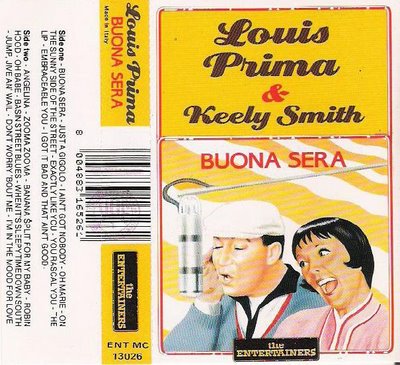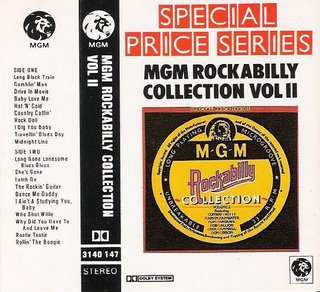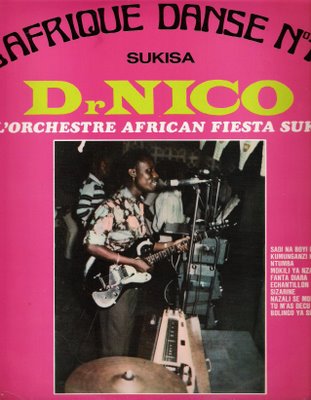
Another tape from the remaindered record stall at Brick Lane in the 90's on the Sarabandas label- made in Italy in 1987. Not sure of the dates of the recordings which seem to be from various parts of his Louis Prima's career.
"Louis Prima's career began in the early 1930's, playing jazz trumpet in the style of fellow New Orleans trumpeter Louis Armstrong. Prima led his own swing band throughout most of the 30's and 40's, and starting in the mid-50's, he spent the rest of his career as a Las Vegas style entertainer. But during the late 40's and early 50's, he played a style of music closely resembling what we call rock and roll today.
Louis Prima was not an imitator of early R&B. On the contrary, many early R&B artists copied Prima. He was one of the only white artists who consistently showed up on the R&B* charts in the mid and late 40's, and many of his songs were covered by black artists. For example, Wynonie Harris, Jimmy Preston, Roy Milton, Joe Morris, and Larry Darnell all made the R&B charts with covers of Prima compositions. Prima made the R&B* charts himself with "White Cliffs Of Dover," "Robin Hood," and "I'll Walk Alone," in 1944 and '45. It's no stretch of the truth to say that Louis Prima was one of the innovators of early R&B. Just as important, he was a superstar in the Italian community, and a major inspiration for the earliest Italian rock and roll artists, some of whom, such as Jimmy Cavallo, Sam Butera, and Pat The Cat, pre-date the entrance of rock and roll into the mainstream. Cavallos first R&B records were cut in 1951, Pat The Cat's were cut in 1952. Earlier still were some 1949 R&B recordings on the X label by a very young Sam Butera, who not only was inspired by Louis Prima in the 40's, but teamed up with him in the 50's and stayed with him for decades."
"Keely Smith was only 15 when she first saw Prima perform in New York City. The following summer, Prima played her hometown of Norfolk, Virginia, at the same time he was looking for a new female singer. Smith won the job on a more or less spur-of-the-moment audition, and recorded her first duets with Louis in 1949. Eventually they became romantically involved as well, marrying in 1953, and recording throughout the '50s, though they had their greatest success as one of Las Vegas' most successful stage acts.
When the singers were signed to Capitol, Prima stipulated that Smith get her own recording deal. Her subsequent Capitol albums were accomplished readings of popular standards, sometimes swinging mildly, although Smith seemed more comfortable with ballads. She and Prima left Capitol for Dot at the end of the '50s, and in 1961 she divorced him on grounds of extreme mental cruelty.
Smith would devote more time to her family as the '60s progressed, but she continued recording as a solo act. She made an entire album of Beatles songs (presumably not aimed toward the audience that bought actual Beatles records), and even had a Top 20 British hit in 1965 with "You're Breakin' My Heart." She made a comeback album in 1985 on Fantasy with I'm in Love Again, which featured accompaniment from top West Coast jazzmen Bud Shank and Bill Perkins."
Find out more about Louis Prima
HERE at his official website.
Louis Prima & Keely Smith - Angelina/Zooma ZoomaLouis Prima & Keely Smith - Banana Split For My BabyLouis Prima & Keely Smith - Basin St. Blues/Sleepy Time Down SouthThese
SendSpace files are available for seven days or until exhausted.


















